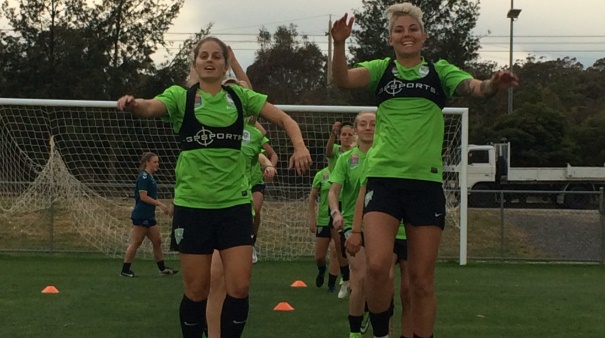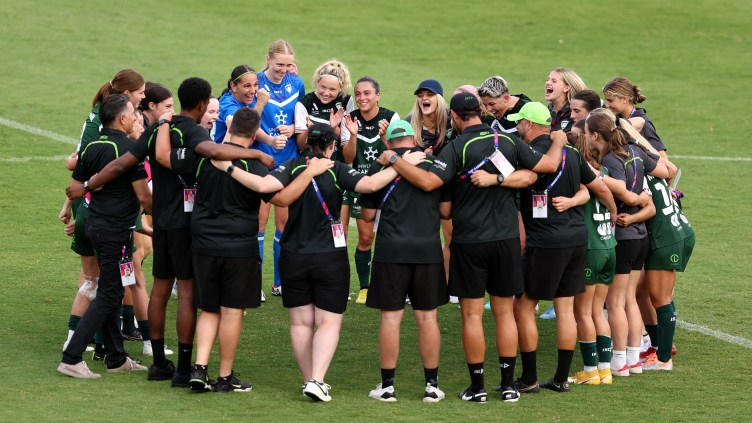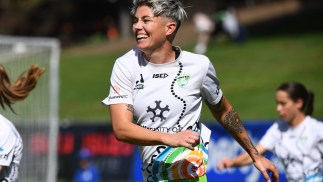CU continues its ground-breaking player monitoring system under the watchful eye of Sports Performance Analyst Jocelyn Mara.
Canberra United have often been at the forefront of developments and best practice when it comes to the Westfield W-League and the 2015/16 season is no exception as the club continues its ground-breaking player monitoring system under the watchful eye of Sports Performance Analyst Jocelyn Mara.
Mara, who is a Teaching Fellow in Performance Analysis at the University of
Canberra and has just completed a PhD with the Research Institute for Sport and Exercise (UCRISE), has been at the pinnacle of this cutting-edge system for the past three seasons, which culminated in the players wearing GPS player tracking devices for the first time in Sunday’s season opener against Brisbane Roar.
“This season is the first time we will be allowed to use player tracking devices in Westfield W-League matches but player monitoring is not a new concept for Canberra United,” Mara told us. “Over the previous two seasons I have monitored GPS and Heart Rate in every training session, and also collected match data using a vision-based player tracking system (i.e. the players were not wearing a device).
“This was part of my PhD research with the Research Institute for Sport and Exercise at the University of Canberra (UCRISE), which I have now completed. From this research I have developed match profiles based on each players’ position which I can use in training to ensure each individual player is not being overloaded or underloaded.
“I have also developed a number of conditioning training programs including an acceleration and deceleration program and a repeat-sprint program. The great thing about this is that these profiles and programs are specific to female players, and even better, they are specific to our Canberra United players. Having a two year head start on this has also allowed me to evolve the monitoring system and make it better each year.”
As the Performance Analyst for Canberra United, Mara spends her time monitoring the players’ training and match load using a GPS player tracking system and heart rate monitors. The player tracking system allows the club to acquire data in real-time related to total distance covered, distances covered at different speed zones, number of high-speed actions, accelerations and decelerations. In real-time United can also see players’ current heart rate, percentage of their individual heart rate maximum, and time spent in different heart rate zones. She also uses the data collated in other ways.
“We monitor how hard players think training and matches were using a self-report rate of perceived exertion (RPE) scale,” she commented. “The GPS data collected on match day allows us to create individual player profiles based on their playing position, and then in conditioning training we can ensure that we are replicating the high-speed demands of matches.
“If it is a lighter session we ensure that players are not going over a pre-defined threshold of match demands (e.g. 40-50%). The live heart rate monitoring also allows us to see if players are working in a target zone (e.g. 90% of HRmax) or if they are finding the session too hard or too easy. The RPE and wellbeing scales allows us to then see how the players are responding to training.
The monitoring system has provided the United coaching staff with both objective information (GPS and Heart Rate) and subjective information (RPE and wellbeing from players). This system takes the guess-work out of coaching and provides valuable information to ensure we do not overload or underload the players as Mara confirms.
“This system also allows players to let us know how they are feeling from training and we can modify their load accordingly,” she said. “The players have also responded really well to the monitoring system and putting on their GPS and heart rate monitors before sessions has become part of their training routine. The players like knowing how much they have done in training and matches and if they are getting fitter.”
With the field of Performance Analysis constantly evolving there is much more that Mara can offer the club as she continues to develop the player profiles and continues to develop the system to make it as efficient and meaningful as possible.
“I have two rules when it comes to performance analysis,” Mara revealed. “Number one is don’t collect anything you can’t use. For every piece of data we collect there is a reason why we do it, and there is a way we can use it. We don’t waste our time on information we can’t directly use in training or matches. Number two is invest in good people, not in products. Sure, you may need technology to collect data but if you don’t have someone that knows what to do with that data than the product is useless.”
With Mara on board United have certainly invested in good people and her data analysis just might give Canberra the edge as they attempt to go back-to-back in Westfield W-League Season 8.





